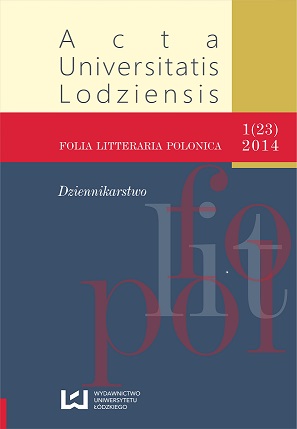Od „dobra Polski” do „zadania Tuska” – tużpowyborcze komentarze redakcyjne w ogólnopolskiej prasie codziennej w latach 1989–2011
DOI:
https://doi.org/10.18778/1505-9057.23.14Słowa kluczowe:
editorial, newspapers, parliamentary electionAbstrakt
The article analyses a collection of 52 editorials published in 19 national journals between 1989 and 2011 directly following general elections. The purpose was to establish how an editorial in the Polish daily press of that time evolved, if it was a form used by editors to make official statements about important social events, how the relationship between texts’ functions were shaped, and how this affected the meaning content of published material.
It was established that at first editorials highlighted the fundamental significance of the results of general elections for the creation of a new political and social order in Poland and emphasized the obligation this imposed on both voters and those seeking election. In the mid-1990s, authors regarded the act of voting as an important and proven tool for putting public life in order that did not always serve its purpose. In the 21st century, publicists were more inclined to perceive the mechanisms of democracy through a personal dimension.
The editorial gradually drifted away from being a text which focused on the election and participation in it as exceptional and seminal. It started to become a collection of the author’s personal evaluations and of conclusive opinions on the current political situation. Not lacking in judgmental statements, it was meant to provide an understanding of a situation rather than to urge to a specific action.
Commentators evaluated the outcome of each election, referring to detailed issues, such as turnout, the potential, anticipated difficulties the winner of an election would face, and the factors that would determine the outcome. The anticipation of upcoming events remained an essential feature of the editorial; authors, however, gradually retreated from advising politicians on specific solutions.
Pobrania
Bibliografia
Aleksandrowicz P., [b.t.], „Rzeczpospolita” 1993, nr 220, s. 1.
Google Scholar
Aleksandrowicz P., Szansa na dokończenie reform, „Rzeczpospolita” 1997, nr 221, s. 5.
Google Scholar
Andrysiak A., Wyzwania Donalda Tuska, „Życie Warszawy” 2007, nr 247, s. 2.
Google Scholar
Barański M., [b.t.] [Sto słów], „Trybuna” 2007, nr 248, s. 1.
Google Scholar
Domański J., * * *, „Sztandar Młodych” 1993, nr 184, s. 3.
Google Scholar
Drozdowski S., Protest powyborczy, „Super Express” 2007, nr 247, s. 2.
Google Scholar
Engelgard J., Co po wyborach, „Słowo Dziennik Katolicki” 1993, nr 169, s. 1.
Google Scholar
Fąfara P., Tusk zmienił władzę. Czy zmieni też kraj?, „Polska Dziennik Łódzki” 2007, nr 247, s. 3.
Google Scholar
Fikus D., Łamigłówka, „Rzeczpospolita” 1991, nr 253, s. 1.
Google Scholar
Harłukowicz J., Polacy was rozliczą, „Super Express” 2005, nr 225, s. 3.
Google Scholar
Jankowski G., Polacy czekają na nowy rząd, „Fakt” 2005, nr 225, s. 2.
Google Scholar
Kowalczyk J., Niewiele będą mogli, niewiele będą chcieli, „Puls Biznesu” 2011, nr 194, s. 2.
Google Scholar
Kowalski A., Do następnych wyborów, „Nasz Dziennik” 2007, nr 247, s. 3.
Google Scholar
Kurski J., [b.t.] [komentarz], „Gazeta Wyborcza” 2007, nr 247, s. 1.
Google Scholar
Lisicki P., Silna polska demokracja, „Rzeczpospolita” 2007, nr 247, s. 2.
Google Scholar
Lisicki P., Wyborcy wybaczyli Donaldowi Tuskowi, „Rzeczpospolita” 2011, nr 236, s. 2.
Google Scholar
Łukasiewicz M., Zwycięstwo zobowiązuje, „Rzeczpospolita” 2001, nr 223, s. 2.
Google Scholar
Miarecki T., Na początku było słowo, a potem komentarz, [w:] Dziennikarstwo od kuchni, red. A. Niczyperowicz, Poznań 2001. Michnik A., [b.t.], „Gazeta Wyborcza” 1993, nr 220, s. 1.
Google Scholar
Michnik A., Polskie młyny, „Gazeta Wyborcza” 2001, nr 223, s. 1.
Google Scholar
Michnik A., Radość i… chwila namysłu, „Gazeta Wyborcza” 1989, nr 21, s. 1.
Google Scholar
Mroziewicz K., Dziennikarz w globalnej wiosce, wyd. 2 poszerz. i uzup., Bydgoszcz–Warszawa 2006.
Google Scholar
Pielecki W., [b.t.] [Sto słów], „Trybuna” 2001, nr 223, s. 1.
Google Scholar
Redaktor [Witold Gadomski], Lewicowa alternatywa, „Nowa Europa” 1993, nr 183, s. 1.
Google Scholar
Rolicki J., Te wybory wygrywa Tusk, „Fakt” 2007, nr 247, s. 6.
Google Scholar
Rybiński M., Nic się nie skończyło, „Fakt” 2007, nr 247, s. 6 .
Google Scholar
Rzekanowski J., [b.t.] [Sto słów], „Trybuna” 2005, nr 225, s. 1.
Google Scholar
Skalski E., Pierwszy Sejm III Rzeczypospolitej, „Gazeta Wyborcza” 1991, nr 252, s. 1.
Google Scholar
Subotić M., Wygrała opcja socjalna, „Rzeczpospolita” 2005, nr 225, s. 1.
Google Scholar
Sztabińska J., W końcu stabilizacja, „Dziennik Gazeta Prawna” 2011, nr 196, s. 1.
Google Scholar
Szymczycha D., Nie tylko arytmetyka wyborcza, „Sztandar Młodych” 1989, nr 111, s. 2.
Google Scholar
Warzecha Ł., Kaczyński na to zasłużył, „Fakt” 2007, nr 247, s. 6.
Google Scholar
Wojtak M., Analiza gatunków prasowych. Podręcznik dla studentów dziennikarstwa i kierunków pokrewnych, Lublin 2008.
Google Scholar
Wojtak M., hasło: Komentarz, [w:] Słownik wiedzy o mediach, red. E. Chudziński, Warszawa–Bielsko-Biała 2007.
Google Scholar
Wolny-Zmorzyński K., Kaliszewski A., hasło: Komentarz, [w:] Słownik terminologii medialnej, red. W. Pisarek, Kraków 2006.
Google Scholar
Wolny-Zmorzyński K., Kaliszewski A., Furman W., Gatunki dziennikarskie. Teoria – praktyka – język, Warszawa 2006.
Google Scholar
Wybranowski W., Prezydent wszystkich lewaków!, „Nasz Dziennik” 2001, nr 223, s. 1.
Google Scholar
Zalewski J., Chropowata koalicja albo kolejne wybory, „Puls Biznesu” 2005, nr 186, s. 2.
Google Scholar
Zalewski J., Skuteczność państwa powinna się poprawić, „Puls Biznesu” 2001, nr 186, s. 2.
Google Scholar
Zaremba P., Sukces strategii Tuska, „Dziennik Polska – Europa – Świat” 2007, nr 247, s. 4.
Google Scholar
Zaremba P., W czyim imieniu?, [w:] Biblia dziennikarstwa, red. A. Skworz, A. Niziołek, Kraków 2010.
Google Scholar
Pobrania
Opublikowane
Jak cytować
Numer
Dział
Licencja

Utwór dostępny jest na licencji Creative Commons Uznanie autorstwa – Użycie niekomercyjne – Bez utworów zależnych 4.0 Międzynarodowe.











